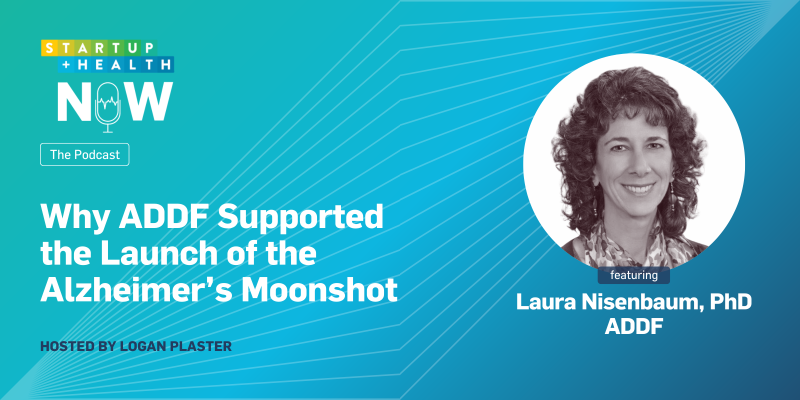Podcast: Play in new window | Download (27.9MB)
Subscribe: Spotify | iHeartRadio | Email | Deezer | RSS | More
“Academia is a great area and fosters innovation, but then taking that science and translating it into something that can actually impact human health has a number of challenges. So trying to understand what those barriers are and how we can help bridge them is something that we have been able to do at ADDF and in collaboration with StartUp Health.”
In this episode of StartUp Health NOW, we chat with Laura Nisenbaum, PhD, Executive Director of Drug Development at the Alzheimer’s Drug Discovery Foundation (ADDF). Organizations like ADDF are working to translate scientific research into real patient impact, particularly in the field of Alzheimer’s disease, by funding innovative ventures and supporting startups in the biotech space. Dr. Nisenbaum talks with us about new Alzheimer’s tests and therapeutics and pulls back the curtain on how ADDF supports startups.
Key Insights:
-
We are at a tipping point in Alzheimer’s. Our ability to predict and detect – and then treat – Alzheimer’s disease is growing faster than ever.
-
Dr. Laura Nisenbaum was involved in the launch of StartUp Health’s Alzheimer’s Moonshot, a collaboration with The Gates Foundation and ADDF, which is important for advancing research in the field of Alzheimer’s disease.
-
Academia fosters innovation, but translating scientific work into real patient impact poses challenges that need to be understood and bridged.
-
Venture philanthropy model enables funding for innovators who may not receive funding from for-profit companies, allowing for more risky endeavors.
-
The Diagnostics Accelerator challenges the research community to develop cutting-edge biomarkers and explore novel diagnostic technologies that will aid in Alzheimer’s diagnosis and clinical trial design.
-
The potential for AI to revolutionize Alzheimer’s research and diagnosis is evident in the funding and support for innovative companies in the field.
-
Focusing on the biology of aging, including inflammation and mitochondrial dysfunction, could be key in developing novel therapies for Alzheimer’s disease.
-
The field of Alzheimer’s research and care is at an amazing point with the first demonstration of some efficacy for drugs and a huge innovation curve from a biomarkers and diagnostics perspective.
-
We can now detect amyloid in the brain through blood tests, marking an amazing point of innovation in the field of Alzheimer’s research.
-
Pursue innovative ideas with great gusto and perseverance, and take advantage of the incredible network of mentors and collaborators to thrive in the biotech and startup space.
-
The momentum is building in the field of Alzheimer’s research, thanks to the support from organizations like ADDF.
Innovating in Alzheimer’s disease? Learn how you can join our Alzheimer’s Moonshot.
Want more content like this? Sign up for StartUp Health Insider™ to get funding insights, news, and special updates delivered to your inbox.
Funders: Become a Health Moonshot Champion

